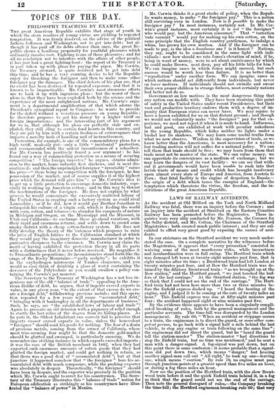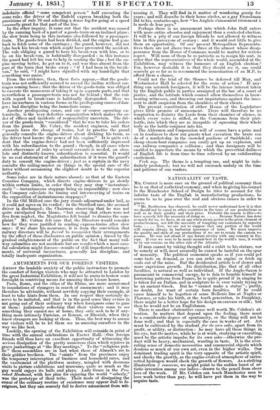LAWS OF RAILWAY ACCIDENTS.
As the accident at Old Milford on the York and North Midland Railway was fatal, there was an inquiry before the Coroner ; and an inquiry into the accident at Stratford on the Eastern Counties Railway has been promoted before the Magistrates. These in- quiries were very ably conducted by Mr. Pearson, the Coroner for the Selby district, and Mr. Cotton, the Chairman of the Stratford Magistrates ; both created much public interest; and they are cal- culated to effect very great good by exposing the causes of acci- dents.
In our strictures on the Stratford accident we very much under- stated the case. On a complete narrative by the witnesses before the Magistrates, it appears that "every precaution" consisted in waiving some of the most murderous risks, while inexactness and insubordination were in full swing. The Hertford train which was damaged left town at twenty-eight minutes past four, that is eight minutes after its time ; a Brentwood train had left London at twenty minutes past four, and at Bow the Hertford train was de- tained by the dilatory Brentwood train : "as we brought up at the Bow station," said the Hertford guard, "we just touched the buf- fers of the last carriage." At the Stratford station, "the fog was so thick that I could not see the end of the carriage." The Hert- ford train had not been here more than two or three minutes be- fore the Enfield express dashed up. "I heard the beating of the engine, and I judged it to be coming at the rate of twenty miles an hour." This Enfield express was due at fifty-eight minutes past four ; the accident happened eight or nine minutes past five. By the evidence there appears to have been a singularly compli- cated breaking of rules, both by the general management and the particular servants. The time-bill was disregarded by the London management. By rule 60, "When an accident or stoppage occurs to a train, the engineman is to direct the guard, or some other com- petent person, to go back with a signal half a mile behind the last vehicle, to stop any engine or train following on the same line" : the engineman did not direct the guard, but he "heard the guard tell the station-master" The station-master "had directions to stop the Enfield train, but no time was mentioned," and he sent a man with a danger-signal. A fog-signal was put down, but on this point there is some confusion : it seems probable that a signal- man did put down two, which means "danger," but hearing another signal-man call out "All right," he took up one—leaving one, which means "caution." By rule 70, no engine must pass through junction-points at a greater speed than five miles an hour, or during a fog three miles an hour.
Now see the position of the Hertford train, with the slow Brent- wood train before it and the quick Enfield train behind it, in a fog so thick that the guard could not see the end of the carriage. Then note the general disregard of rules,—the Company breaking the time-bill; the Hertford engineman breaking rule 60; that very indefinite official "some competent person" half executing the same rule ; the driver of the Enfield express breaking both the provisions of rule 70 and selecting a dense fog for going at a speed unusually great for that part of the line.
In the other inquiry, it came out that the accident was caused by the running back of a part of a goods-train on an inclined plane ; the slow train being in this instance also followed by a passenger- train. The goods-train had been divided, and the engine had gone back to fetch some of the carriages ; the guard, however, did not take back his break-van which ?night have prevented the accident. The rule obliging a guard to have his break-van with him, or to be on his break-van, is habitually disregarded : in this instance the guard had left his van to help in sanding the line but the en- gine moving better, he got on to it, and was thus absent from the part of the train that broke away : "if I had been in the break- van," he said, "I might have signalled with my hand-light that something was amiss.'
From the evidence, then, these facts appear,—that the goods- train was not sufficiently secured to ascend the incline without car- riages coming loose ; that the driver of the goods-train was obliged to execute the manceuvre of taking it up in separate parts, and that nevertheless a passenger-train was not far behind .; that the rule with regard to break-vans is habitually disregarded. Here we have inexactness in various forms as the predisposing causes of dan- ger; bad discipline being the immediate cause.
Another predisposing cause, and one of course operating ex- tensively, is the very defective organization which makes the or- der of offices and incidents of responsibility uncertain. The dri- ver of the goods-train " considered ' that he was to take his orders from the guard. Mr. Cabry, the resident engineer, said that "guards have the charge of trains, but in practice the guard generally consults the engine-driver about dividing his train, as the driver best knows the power of his engine." It is quite evi- dent that the engine-driver had not been sufficiently impressed with his subordination to the guard ; though, in all cases where strict observance of rules by several servants is needed, an abso- lute and distinctly-known subordination is essential. It would be no real abatement of this subordination if it were the guard's duty to consult the engine-driver ; just as a captain in the navy consults the sailing-master on things in the special care of the latter without occasioning the slightest doubt as to the superior authority.
Some rules are in their nature absurd; as that of the Eastern Counties Company, which directs engine-drivers to go slowly within certain limits, in order that they may stop "instantane- ously "—instantaneous stoppage being an impossibility : now does the Company calculate its timing and interweaving of trains on the supposition of instantaneous stoppages ?
In the Old Milford case the jury stands adjourned under bail, as it could pot agree on its verdict : in the Stratford case, the accused driver discharged; ed ; the Chairman observing that he was not quite exculpated from blame, "but seeing that others were not free from neglect, the Magistrates felt bound to dismiss the com- plaint." Mr. Cotton felt sure that the Directors would consider how far they were justified in sending express-trains after slow ones : if we share his assurance' it is from the conviction that railway directors will be fo2-eed to reconsider their arrangements by the effect of these disclosures on public opinion ; forced by the gradual enlightenment of the public on the fact that many rail- way calamities are not accidents but are results which a more care- ful calculation might foresee—results of still imperfeeted arrange- ments, of universal inexactness, generally lax discipline, and tetally inadequate organization.































 Previous page
Previous page